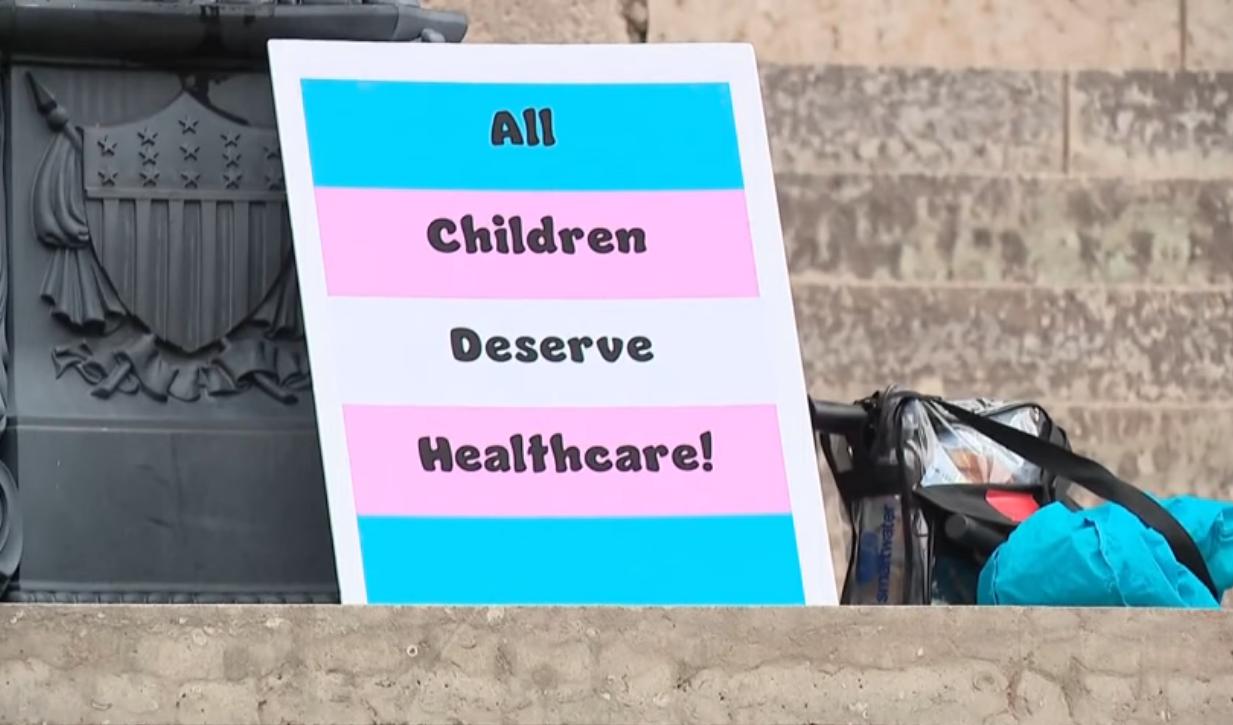Ohio
Heavy accumulation of snowfall makes clearing it a ‘fabulous’ effort
Winters in Cleveland can be a dreary time, but now we can hopefully at least look forward to another visit….

LAKEWOOD, Oh. – As an Arctic air mass moved across the Midwest and into the Northeastern U.S. this past weekend, drawing in precipitation that led to several inches of snow falling with upwards of a foot or more in some areas and temperatures hovering in the teens to mid twenties, residents in this suburban Cleveland city were greeted with the sight of one person apparently untroubled by the weather.
The Plain Dealer/cleveland.com reported that a magical being appeared on Lakewood’s Wagar Avenue this weekend, snow blowing the sidewalk after Northeast Ohio got hit with inches of snow on Sunday.
A person dressed in an inflatable unicorn costume grabbed neighbors’ attention, working their way down Wagar Avenue, snow blowing the sidewalk for the entire street.
Local Lakewood resident, Bethany Staley took a couple of photos and a video and posted them to the Lakewood Community Facebook group, with the caption “Such an awesome community!!! The Wagar Ave. Unicorn was back this year and just made my night!!! My family and I loved watching him plow on by!!! Thank you, neighbor.”
The pictures were then shared on Twitter Sunday by SuzyLeeInCLE aka @WeThePeopleCLE which was then taken viral by appreciative users since its initial posting.
Someone in Lakewood dons a unicorn costume while snow blowing and this is the kind of community I want. pic.twitter.com/yYlfH42jAG
— SuzyLeeInCLE (@WeThePeopleCLE) January 23, 2022
John Corlett replied to the tweet with a photo taken of the unicorn on Christmas Day in 2020.
On Wagar Avenue in Lakewood, here he is on Christmas 2020 pic.twitter.com/lb3cOykMEv
— John Corlett (@CommunitySolsED) January 24, 2022
“I was actually kind of sad when it didn’t snow this year on Christmas. I thought we might see him again,” Corlett said. “I remember that he even snow-blowed the driveway of someone who lived across the street.”
The Plain Dealer/cleveland.com noted; “Winters in Cleveland can be a dreary time, but now we can hopefully at least look forward to another visit from the mystical Lakewood snow-blowing unicorn, the next time it snows.”
Ohio
Ohio court temporarily blocks gender-affirming care ban
“Today’s ruling is a victory for transgender Ohioans & their families. The ban is an openly discriminatory breach of rights of trans youth”

COLUMBUS, Ohio – Today, the Franklin County Court of Common Pleas issued a temporary restraining order to prevent the ban on gender-affirming care for transgender youth from taking immediate effect.
A new lawsuit filed by the ACLU of Ohio alleges that the ban on gender-affirming care, passed into law earlier this year, violates multiple provisions of the Ohio state Constitution.
This action comes in the wake of a decision by the 6th Circuit Court of Appeals, under which Ohio falls, that dismissed federal constitutional concerns regarding bans on gender-affirming care for transgender youth. This latest legal challenge, however, focuses on the Ohio state Constitution and is filed in the Franklin County Court of Common Pleas.
According to the recently released filing, attorneys argue that a state constitutional amendment, passed by Republicans in 2011 to prevent the implementation of the Affordable Care Act (Obamacare), may, in fact, make the ban on gender-affirming care for transgender youth unconstitutional.
In 2011, Republicans in Ohio voiced concerns that the Affordable Care Act would limit healthcare choices. Misinformation about “death panels” became widespread nationally. At the same time, there was controversy over whether individuals could retain their doctors under the new federal healthcare program. In reaction, Ohio Republicans and the local Tea Party, a then-active anti-Obamacare movement within the Republican Party, advocated for a constitutional amendment to prohibit penalties related to the purchase of healthcare or health insurance. The amendment was approved by popular vote and took effect shortly thereafter.
The amendment reads as follows:
(B) No federal, state, or local law or rule shall prohibit the purchase or sale of health care or health insurance.
(C) No federal, state, or local law or rule shall impose a penalty or fine for the sale or purchase of health care or health insurance.
Now, in the latest lawsuit filed by the ACLU, attorneys argue that the new gender affirming care ban for transgender youth set to go into effect on April 24th violates these constitutional protections in the state. In the lawsuit, attorneys argue that “gender-affirming care, including the prescription of puberty-delaying medication and/or hormone therapy to minor patients where appropriate in the judgment of a physician, is ‘health care’ within the meaning of Article I, Section 21.” They argue that the law imposes penalties and prohibits the purchase of health care, rendering it unconstitutional.
The plaintiffs, represented by the American Civil Liberties Union, the ACLU of Ohio, and the global law firm Goodwin Procter, successfully argued that the plaintiffs are likely to win their claim that House Bill 68 violates the Ohio Constitution because it covers more than one single subject.
The Court enjoined the Health Care Ban as well as a ban on transgender girls participating on girls or women’s sports teams that was also contained within House Bill 68.
In a statement the ACLU said that the group will continue the litigation to ultimately obtain a permanent injunction on behalf of Ohio families whose children are at risk of losing critical life-saving medical care.
The temporary restraining order is in effect for 14 days or until the hearing of plaintiffs’ motion for a preliminary injunction, whichever is sooner. HB 68 was originally set to take effect on April 24.
“We are thrilled and relieved that Ohio’s ban on gender-affirming health care has been halted and that transgender youth can continue, for the near term at least, to access medically necessary healthcare,” Freda Levenson, Legal Director for the ACLU of Ohio, said. “Our legal battle will continue until, we hope, this cruel restriction is permanently blocked. Ohio families have a constitutional right to make personal healthcare decisions without government intrusion.”
Harper Seldin, an ACLU Staff Attorney noted:
“Today’s ruling is a victory for transgender Ohioans and their families. Ohio’s ban is an openly discriminatory breach of the rights of transgender youth and their parents alike and presents a real danger to the same young people it claims to protect. We are committed to opposing this law until it is permanently overturned, making Ohio a safer place to raise every family.”
Allison DeLaurentis and Miranda Hooker, Complex Litigation & Dispute Resolution Partners, for the law firm of Goodwin Procter said:
“Today’s ruling not only upholds the rights of transgender individuals but also champions the principle that healthcare should be accessible, and above all, inclusive.”
Additional reporting by Erin Reed
Ohio
Trans student bathroom ban bill passes Ohio House Committee
HB 183 would require Ohio K-12 schools & colleges mandate students only use bathroom or locker room that matches their sex assigned at birth

By Megan Henty | COLUMBUS, Ohio – A bill that would ban transgender students from using the bathroom and locker room that matches up with their gender identity passed out of the Ohio House Higher Education Committee Wednesday by a 10-5 party line vote.
State Reps. Beth Lear, R-Galena, and Adam Bird, R-New Richmond, introduced House Bill 183 which would require Ohio K-12 schools and colleges to mandate that students could only use the bathroom or locker room that matches their sex assigned at birth. It would also prohibit schools from allowing students to share overnight accommodations with the opposite sex.
HB 183 now awaits further consideration in the House, which is next scheduled to be in session April 24.
Parents, grandparents, and school superintendents asked Bird for this bill, he said.
The American Medical Association officially opposes policies preventing transgender individuals from accessing basic human services and public facilities consistent with gender identity.
HB 183 would not prohibit a school from having single-occupancy facilities and it would not apply to someone helping a person with a disability or a child younger than 10 years old being assisted by a parent, guardian, or family member.
State Rep. Gayle Manning, R- North Ridgeville, thought about bringing an amendment to the committee that would have carved colleges and universities out of the bill, but she decided against it.
“I’m hopeful we will continue to have these discussions on the removal of higher ed,” she said. “The reason being, we’re talking about adults. Universities are similar to a city with the number of students that they have. Frivolous lawsuits that will increase the cost of tuition eventually and the cost of our families.”
Manning voted in favor of the bill even though she hopes lawmakers can continue conversations to “find a better solution.”
Bird opposes taking the higher education component out of the bill.
“The reason I oppose that is because we have college credit plus in Ohio,” he said. “We seventh graders going to college, kids in high school going to colleges and in that college environment, we got to make sure they are protected.”
State Rep. Joe Miller, D-Amherst, vocalized his disdain for the bill before the committee voted.
“Here we are again … taking away school districts and colleges’ ability and their leadership to make decisions that are best for providing safe, equitable access for all Ohio students,” Miller said. “I hope that this doesn’t see the floor and doesn’t see the governor’s desk.”
More than 100 people submitted opponent testimony on HB 183 and more than 30 people submitted proponent testimony.
“We do love and care about all kids,” Bird said when asked about all the backlash the bill has received. “Me and my Republican colleagues have heard from constituents all across the state. They may not have been loud. They may not have been vocal. They may not have come with a sign to the Statehouse, but we are here representing the vast majority of Ohioans who want protections.”
Trans advocates speak out against HB 183
Transgender advocates hosted a press conference following the House Higher Education Committee to voice their opposition to HB 183. Trans Ohio Board Member Carson Hartlage said HB 183 is harmful to all students, including cisgender students.
“Most trans non binary and gender non conforming students only begin using restrooms that align with their gender identities after they’ve experienced some form of trauma when using a restroom that aligns with their sex assigned at birth,” Hartlage said.
Thirty percent of LGBTQ+ students said they were prevented from using the bathroom that aligned with their gender, and 26% were stopped from using the locker room that aligned with their gender, according to Ohio’s 2021 state snapshot by GLSEN, which examines the school experiences of LGBTQ middle and high school students.
When looking specifically at transgender and nonbinary students, 42% were prevented from using the bathroom that aligned with their gender and 36% couldn’t use the locker room that aligned with their gender, according to the Ohio GLSEN report.
Ohio’s first openly transgender public official and member of the Gahanna-Jefferson Public Schools’ Board of Education Dion Manley shared his concerns.
“As a trans man is I’ve been going into men’s restrooms for 25 years without incident,” Manley said. “I go visit the schools on a regular basis. So these legislators want me to go into a girls restroom in the elementary school, middle school, and high school.”
Mallory Golski, civic engagement and advocacy manager at Kaleidoscope Youth Center, said how Ohio was recently at the center of history in a positive way with Monday’s eclipse.
“We’re here reflecting on how we’re at the epicenter of another piece of history,” she said. “And unfortunately, we’re at the wrong place at the wrong time. Unlike the fleeting blackout of the total solar eclipse, the history I’m talking about here today at the statehouse leaves transgender youth in the dark.”
Jeanne Ogden’s daughter would be directly impacted by this bill. Her daughter’s college classroom building does not have single-use restrooms in the building, forcing her daughter to go across the street to use the restroom.
“These kids getting bullied and yes, their mental health is suffering,” said Ogden, the executive director of Trans Allies of Ohio. “Trans people are tired. Parents are exhausted.”
******************************************************************************************

Megan Henry is a reporter for the Ohio Capital Journal and has spent the past five years reporting in Ohio on various topics including education, healthcare, business and crime. She previously worked at The Columbus Dispatch, part of the USA Today Network.
******************************************************************************************
The preceding article was previously published by the Ohio Capitol Journal and is republished with permission.
The Ohio Capital Journal is an independent, nonprofit news organization dedicated to connecting Ohioans to their state government and its impact on their lives. The Capital Journal combines Ohio state government coverage with incisive investigative journalism, reporting on the consequences of policy, political insight and principled commentary.
We’re part of States Newsroom, the nation’s largest state-focused nonprofit news organization.
Ohio
As drag goes ‘mainstream,’ some red states look to restrict them
Most Americans oppose bans, but Republicans keep filing drag-related bills at a time when drag has become a form of mainstream entertainment

By Amanda Hernández | COLUMBUS, Ohio – Drag performances used to be found mostly in the confines of nightlife venues such as clubs and bars.
But drag has stepped into the daylight, with elaborately costumed and made-up performers appearing at library readings and kid-friendly brunches, and a newfound visibility for gender-bending entertainment and self-expression.
“Drag now versus 15 years ago is like night and day,” said Dr. Lady J, a Cleveland-area performer with a doctoral dissertation in drag history. “Drag is so mainstream now. … I grew up in a world where drag queens were this mysterious thing that maybe existed in New York or San Francisco.”
The growing visibility has made drag performances a target for conservative legislators. Although polls show most Americans don’t support laws to restrict drag performances, lawmakers in states including Ohio, Kentucky, Missouri, Nebraska, South Dakota and West Virginia have considered or enacted legislation this session that would prohibit businesses from allowing minors to attend drag shows. Several would impose stricter business regulations on establishments that host drag shows or would ban “obscene live conduct” at state universities.
Two Ohio Republican lawmakers have introduced legislation that would ban drag performers from working anywhere that isn’t designated as an adult entertainment facility. The way the law is written, it would also appear to ban any theatrical performance where a character wears clothing opposite gender at birth.
Supporters of these bills say they are designed to protect children from entertainment that is not appropriate for them, not to target the transgender community. But critics warn that such laws could be used to file criminal charges or discriminate against people who identify as transgender outside of drag performances. This year, 21 drag-related bills have been considered in 12 states, according to the ACLU’s LGBTQ+ bill tracking database. (Some were carried over from last year’s legislative sessions.)
Most of them failed. Of 15 drag bills considered last year, only three were carried over to this year’s legislative sessions, according to the ACLU’s database. Those that become law often face significant legal challenges.
In Montana, where a law explicitly restricting drag performances was enacted last year, federal court orders have rendered it unenforceable.
Courts also have deemed the laws in Florida, Tennessee and Texas — all of which use similar language about “adult cabaret entertainment” or “sexually oriented businesses” — unenforceable. A federal court ruled that the Texas law was unconstitutional and violated the First Amendment.
Legislation restricting gender-affirming care, transgender girls’ participation in school sports and restroom access is also on the table in many states.
Dr. Lady J says drag-related bills deflect attention from deeper issues facing the LGBTQ+ community.
“[These drag-related bills are] distracting people from the actual anti-trans laws that are being passed,” she said. “It’s flashier to talk about drag than it is to talk about what it means to tell a 12-year-old, 14-year-old trans kid they can have hormones one day and the next day to tell them that thing that you thought was going to save your life … the government decided yesterday you don’t get it anymore. Good luck surviving, kid.”
Largely backed by GOP lawmakers, bills affecting drag performances have often surfaced during election cycles, experts pointed out, deployed to mobilize conservative voter bases.
“[Drag] is the latest in a series of LGBTQ-related issues that [some Republicans] have found compelling as a way of firing up their base and getting folks either to contribute money or to come out and vote for them,” said Melissa Michelson, a political scientist and LGBTQ+ politics expert at Menlo College in California.
The focus on drag-related legislation is likely to wane as election season fades, Michelson added. “It’s all about riling up the public. There’s no actual threat. It’s very much an electoral politics phenomenon.”
Dr. Lady J said these efforts aren’t about protecting children but rather about erasing LGBTQ+ visibility from public spaces. When she performs at kid-friendly events, she is deliberate about selecting music and attire that are both appropriate for and captivating to younger audiences, such as a headdress adorned with pony figurines inspired by the popular toy and show “My Little Pony,” Dr. Lady J told Stateline.
“The reality is that a lot of these people just don’t want queer people anywhere near their kids,” she said. “They don’t want their kids to see that you are allowed to grow up and be happy and be a queer person.”
Many who are backing the bills disagree, saying they’re worried about how adult content is seeping into everyday life.
“We’ve really come to a place where things that were always considered adult-oriented have moved into the public sector and have been marketed and advertised at family-friendly events, when truly they were very sexual in nature,” Kentucky Republican state Sen. Lindsey Tichenor said in an interview.
State legislative efforts
Tichenor has sponsored a bill targeting performances “with explicitly sexual conduct” in “adult-oriented businesses” near places children might be.
Her bill would restrict these businesses from operating within roughly a city block’s distance — about 933 feet — of other establishments serving children, such as schools, playgrounds or day care facilities. Violators risk losing business or liquor licenses and may face cease-and-desist orders. Local governments also would have the power to impose stricter rules.
“A lot of the opposition really isn’t informed [about] exactly what is in the legislation. And it’s really, very simply, putting adult-oriented businesses in the proper place where minors can’t have access to it,” said Tichenor.
When initially introduced, the bill contained language that redefined as adult-oriented businesses establishments that “host sexually explicit drag performances.” Tichenor said she made several adjustments to the bill after meeting with performers who were concerned with the proposed revised definition. The current version of the legislation no longer references all drag, but describes adult cabaret that contains “explicitly sexual conduct.”
“I thought it was very important that we had that definition specific to drag performances that are of a sexual nature and where those can be and where they cannot be,” she said.
This legislative session, only one related measure has been signed into law, in South Dakota. Approved in early March, the law prohibits the state Board of Regents and the public universities it oversees from using state funds or property for “obscene live conduct.”
While the law does not explicitly ban drag shows, some opponents believe it’s a veiled attempt to target them because two bills with similar language, with one explicitly banning drag, died earlier this year.
“It’s kind of impeaching on First Amendment rights –– free expression, freedom of speech,” said Everett Moran, a legislative intern with the Transformation Project Advocacy Network, a South Dakota-based trans advocacy group.
The bills come after controversy erupted in 2022 over a drag show held at South Dakota State University in Brookings that was advertised as kid-friendly. There was backlash, and the Board of Regents set a policy that prohibits programs on campus where minors are present from including specific sexual activities, obscene live conduct or any material meeting the definition of “harmful to minors.”
Proponents of the law said it reflects that policy.
“This [bill] complements [the board’s policy] and says, you know what, this is more than just a policy. This is a law. You broke a law,” Republican Rep. Chris Karr, the bill’s lead sponsor, told colleagues ahead of the bill’s vote in the House in early February. Karr could not be reached for comment for this story.
No one from the Board of Regents testified in favor of or against the bill, but when asked about how the new law would be enforced, the board said in a statement that it “does not currently authorize or expend public funds to support obscene live conduct, as defined in codified law 22-24-27, on any South Dakota public university campus.”
South Dakota state Rep. Linda Duba, a Democrat who voted against the measure, said the law will not affect the transgender community. Still, she said, the law is unnecessary and “purely political.”
“It’s an election year, and the [Republican] supermajority decided this would be something they thought we should do even though we have policies in place that make this bill unnecessary,” Duba said in an interview. “We’ve already defined in current statute what obscenity is, and we have a policy in place by the Board of Regents, and the bill doesn’t do anything different.”
A different time
In West Virginia, a bill introduced in January would have amended the state’s indecent exposure law to criminalize engaging in “obscene matter.” The bill’s definition of “obscene matter” includes “any transvestite and/or transgender exposure, performances, or display to any minor.”
The bill’s lead sponsor, Republican Sen. Mike Azinger, could not be reached for comment, and co-sponsor, Republican Sen. Robert Karnes, declined Stateline’s interview request. Before the state’s legislative session ended, the bill was sent to the Judiciary Committee.
In Missouri, a Senate and House bill would each add performances featuring male or female impersonations to the definition of sexually oriented businesses. Both bills are in committee. Under the bills, performers could potentially face felony charges for performing in public spaces where the show could be viewed by a child.
And in Nebraska, legislation that would restrict minors — defined by state law as anyone under 19 — from attending drag shows, appeared to die after the legislature’s Judiciary Committee voted against advancing it. The proposed legislation would have imposed misdemeanor charges, carrying a maximum penalty of up to a $1,000 fine and one year in jail, against anyone — including parents — who brings a child to a drag event.
Fifty-eight percent of Americans oppose laws that would impose restrictions on drag shows or performances in their state, while 39% support such legislation, according to a 2023 NPR-PBS NewsHour-Marist poll.
Despite the varied opinions among Americans, these drag-related bills have emerged at a time when drag has become a form of mainstream entertainment and widely popular, said Michelson, the political scientist and LGBTQ+ politics expert. This differs from previous attacks on members of the LGBTQ+ community throughout history, who were targeted during a time when stigma was rampant, Michelson added.
“These bans aren’t going to be particularly successful or popular in the way that folks are maybe hoping they will be. It’s kind of too late,” Michelson said. “If they had gone [after] drag performers a decade ago, 15 years ago, it probably would have hit more successfully.”
******************************************************************************************

Amanda Hernández covers criminal justice for Stateline. She has reported for both national and local outlets, including ABC News, USA Today and NBC4 Washington.
******************************************************************************************
The preceding article was previously published by the Ohio Capital Journal and is republished with permission.
The Ohio Capital Journal is an independent, nonprofit news organization dedicated to connecting Ohioans to their state government and its impact on their lives. The Capital Journal combines Ohio state government coverage with incisive investigative journalism, reporting on the consequences of policy, political insight and principled commentary.
We’re part of States Newsroom, the nation’s largest state-focused nonprofit news organization.
Ohio
ACLU of Ohio files new lawsuit on gender-affirming care ban
Attorneys argue that a constitutional amendment promoted by Republicans against the Obamacare may actually overturn a trans healthcare ban

By Erin Reed | COLUMBUS, Ohio – A new lawsuit filed by the ACLU of Ohio alleges that the ban on gender-affirming care, passed into law earlier this year, violates multiple provisions of the Ohio state Constitution.
This action comes in the wake of a decision by the 6th Circuit Court of Appeals, under which Ohio falls, that dismissed federal constitutional concerns regarding bans on gender-affirming care for transgender youth. This latest legal challenge, however, focuses on the Ohio state Constitution and is filed in an Ohio Court of Common Pleas.
According to the recently released filing, attorneys argue that a state constitutional amendment, passed by Republicans in 2011 to prevent the implementation of the Affordable Care Act (Obamacare), may, in fact, make the ban on gender-affirming care for transgender youth unconstitutional.
In 2011, Republicans in Ohio voiced concerns that the Affordable Care Act would limit healthcare choices. Misinformation about “death panels” became widespread nationally. At the same time, there was controversy over whether individuals could retain their doctors under the new federal healthcare program. In reaction, Ohio Republicans and the local Tea Party, a then-active anti-Obamacare movement within the Republican Party, advocated for a constitutional amendment to prohibit penalties related to the purchase of healthcare or health insurance. The amendment was approved by popular vote and took effect shortly thereafter.
The amendment reads as follows:
(B) No federal, state, or local law or rule shall prohibit the purchase or sale of health care or health insurance.
(C) No federal, state, or local law or rule shall impose a penalty or fine for the sale or purchase of health care or health insurance.
Now, in the latest lawsuit filed by the ACLU, attorneys argue that the new gender affirming care ban for transgender youth set to go into effect on April 24th violates these constitutional protections in the state. In the lawsuit, attorneys argue that “gender-affirming care, including the prescription of puberty-delaying medication and/or hormone therapy to minor patients where appropriate in the judgment of a physician, is ‘health care’ within the meaning of Article I, Section 21.” They argue that the law imposes penalties and prohibits the purchase of health care, rendering it unconstitutional.
Attorneys cite major medical organizations and healthcare guidance to argue that gender-affirming care constitutes healthcare. They note that all major medical organizations in the United States endorse gender-affirming care as medically necessary. These include the American Academy of Pediatrics, the Endocrine Society, and the World Professional Association for Transgender Health, among others. Additionally, the federal Department of Health and Human Services has issued several memos defining gender-affirming care as healthcare. Should a judge concur, they could rule that prohibiting gender-affirming care for transgender youth and penalizing doctors violates the constitutional amendment against “imposing a penalty or fine” for the “sale or purchase of health care.”
This is not the first instance where Republican legislation could lead to overturning a ban on transgender care in a state. In Montana in 2023, Republicans enacted a “right to try” act, aimed at ensuring access to unproven COVID-19 treatments such as ivermectin and hydroxychloroquine as well as any other experimental or non-approved treatment. A Montana judge, in a 2023 ruling, found that specifically banning gender-affirming care on the baseless assertion that it is “experimental,” while simultaneously permitting experimental COVID-19 treatments, was overtly discriminatory. For this and additional reasons, the state court judge decided that the ban on gender-affirming care in Montana should be blocked as likely unconstitutional.
The ACLU lawsuit in Ohio claims several violations of the Ohio Constitution. It argues that the bill infringes upon the “single subject rule,” which mandates that no bill in Ohio should encompass more than one subject. This rule exists to prevent “logrolling” of unrelated issues, ensuring that each matter can be debated individually. Within the state legislative debate over the bill, many Republicans sidestepped discussion of the gender-affirming care ban, focusing instead on the sports-related portion of the bill. At times, the debate seemed disjointed, as if Republicans were addressing two separate pieces of legislation. The intent behind single subject rules is to avoid such scenarios. Given that the Ohio trans ban includes provisions on transgender participation in sports, which bears little relevance to the legal status of transgender healthcare, the ACLU contends that the ban contravenes the Constitution. The ACLU also alleges due process and equal protection violations.
The state lawsuit follows mixed outcomes in federal courts regarding bans on gender-affirming care. While federal courts in the 8th and 9th Circuits have blocked these bans, they have been permitted to take effect in several states within the jurisdictions of the 6th, 7th, and 11th Circuit Courts. This situation complicates federal challenges for attorneys in Ohio, as Ohio falls under the jurisdiction of the 6th Circuit, which has allowed such bans to be implemented.
It is unknown when the judge will rule on the lawsuit, but the filing asks for a quick resolution given that the gender affirming care ban is set to go into effect on April 24th of this year. Attorneys ask for a temporary restraining order and/or a preliminary injunction barring the state AG from enforcing the legislation as well as the state medical board from imposing penalties on doctors providing gender affirming care.
****************************************************************************

Erin Reed is a transgender woman (she/her pronouns) and researcher who tracks anti-LGBTQ+ legislation around the world and helps people become better advocates for their queer family, friends, colleagues, and community. Reed also is a social media consultant and public speaker.
******************************************************************************************
The preceding article was first published at Erin In The Morning and is republished with permission.
Ohio
Ohio State University student charged in anti-LGBTQ+ crime
City prosecutors file multiple charges against an individual who vandalized a pride flag & directed homophobic remarks toward residents

COLUMBUS, Ohio – Columbus City Attorney Zach Klein announced that city prosecutors have filed multiple misdemeanor criminal charges against an Ohio State University student who was caught on camera urinating on a pride flag and directing homophobic remarks toward residents at a home in Columbus’s Weinland Park neighborhood in February.
Prosecutors filed four misdemeanor charges against 20-year-old Trey Samuel Fetzer in Franklin County Municipal Court Tuesday, including ethnic intimidation, criminal mischief, criminal trespass and disorderly conduct.
“Vandalizing property and making homophobic remarks in an attempt to intimidate members of the LGBTQ+ community will not be tolerated in our city,” said Columbus City Attorney Zach Klein. “Columbus is diverse and tolerant, and we celebrate our LGBTQ+ community. Hate has no home here, and as long as I’m City Attorney, we will continue to aggressively prosecute hate and bias crimes.”
According to court documents and released home surveillance video, on Feb. 8, the defendant walked up to the front porch of a home in the Weinland Park neighborhood near Ohio
State’s campus and urinated on a pride flag while another man recorded the incident on a cell
phone. The defendant then proceeded to make homophobic remarks and banged on the door of the house before fleeing on foot.
Penalties for the misdemeanor charges filed Tuesday could include hundreds of dollars in fines, possible jail time or probation, among other penalties.
Ohio
Ohio man urinating on home’s pride flag investigated as hate crime
The family posted the video to Reddit after which Columbus Police including the department’s LGBTQ+ liaison officer arrived to investigate

COLUMBUS, Ohio – A blended queer family is speaking out after a man was caught on home surveillance video footage urinating on the family’s pride flag. Columbus Police are now investigating the act of vandalism as a hate crime.
NBC News affiliate WCMH-TV 4 Columbus reported that in the video, a man can be seen walking up the porch of a home in the Weinland Park area near the Ohio State University campus. Meanwhile, a second man stays at the bottom of the porch stairs, recording the incident on a cell phone.
The man on the porch then exposes himself and begins urinating on the pride flag, saying, “Fuck the gays, fuck the gays,” while holding up a middle finger. The man then bangs twice on the house’s doors before the two men run from the scene.
The family then posted the video to Reddit after which Columbus Police including the department’s LGBTQ+ liaison officer arrived to investigate.
A Columbus police spokesman said the incident is being investigated as a hate crime.
A spokesperson for LGBTQ+ advocacy group Stonewall Columbus told WCMH/NBC 4 that while they are not familiar with the specifics of the incident, there is no place in Columbus for such acts.
“As a Columbus resident, I am disheartened to see people have such blatant disrespect for the property of others and as a community organization, we do hope that the individuals in question are swiftly caught and subject to whatever legal recourse there may be,” Stonewall Columbus Executive Director Densil Porteous said in a statement. “We must work to ensure residents and visitors understand that our city is a welcoming and safe place and such acts are not welcome here.”
Related:
Ohio
Trans advocates, DeWine respond to Ohio House overriding veto
Wednesday’s 65-28 vote sends House Bill 68 to the Senate where it needs 20 votes to override DeWine’s veto

By Megan Henry | COLUMBUS, Ohio – The transgender community is grappling with disappointment while Ohio House Republicans celebrate overriding Gov. Mike DeWine’s veto of a bill that would ban gender-affirming care for trans youth, including hormone therapy and puberty blockers.
Wednesday’s 65-28 vote sends House Bill 68 to the Senate where it needs 20 votes to override DeWine’s veto. If both chambers pass the override measure, the bill would go into effect 90 days after the final vote. The next Senate session is Jan. 24 and the bill previously passed with 24 votes in the chamber.
HB 68 is “blatant discrimination” and “out of touch with the actual needs of young people in Ohio,” said Erin Upchurch, executive director of Kaleidoscope Youth Center.
“This bill and others like it unnecessarily targets transgender non-binary youth, their families and allied providers and health care professionals,” Upchurch said.
Ohio Republicans have no interest in protecting or helping transgender children, said Minna Zelch, the mother of a 19-year-old transgender daughter.
“Our children are a sacrifice to them and is a sacrifice that they think is perfectly worth having,” Zelch said. “Our kids are not collateral damage.”
Chase Strangio, the deputy director of transgender justice for the ACLU, has been litigating against similar pieces of legislation across the country for the past four years.
“We recognize the grave harm of legislative measures like this one,” Strangio said.
Equality Ohio is disgusted by the House’s override of DeWine’s veto, said Siobhan Boyd-Nelson, the organization’s co-interim executive director.
“Not only did they override Governor DeWine’s appropriate veto of HB 68, they once again ignored the voices of hundreds of Ohioans who testified against the bill,” Boyd-Nelson said.
Gender-affirming care generally consists of four general practices: social affirmation, puberty blockers, hormone therapy and gender-affirming surgeries, according to the U.S. Department of Health and Human Services’s Office of Population Affairs.
“What we’re talking about is not something newfangled,” said Cathryn Oakley, the senior director of Legal Policy at the Human Rights Campaign. “It’s not something exotic. … We are talking about health care being denied to transgender people simply because they are transgender.”
DeWine’s response to the House’s override
DeWine said Thursday he suspected some of the Republicans voted to override his veto because of the portion of the bill that would prevent transgender athletes from playing women’s sports.

“The sports issue affects only a minute number of people,” DeWine said.“It was not the reason that I vetoed the bill. So I think, by combining those two, a lot of members, at least members I talked to this weekend, had latched on to the issue of sports they felt very strongly about.”
DeWine said he vetoed the bill on Dec. 29 because he believes parents of transgender children should be making these medical decisions, not the government.
“That’s my opinion, it certainly has not changed,” he said. “My veto was not based upon anything having to do with the athletes … I cannot do anything about what the legislature’s position is.”
If a trans girl wants to play on a team with cis girls in Ohio, she must go through hormone treatments for at least one year or show no physical or physiological advantages, according to the Ohio High School Athletic Association.
Despite the House Republicans overriding his veto, DeWine doesn’t think there’s a disconnect between him and members of his own party.
“We are very closely aligned,” he said. “They’re aligned with me as far as education, early childhood education, early childhood development, mental health, the science of reading, these are things that affected most people in the state of Ohio.”
DeWine’s executive order and proposed administrative rules
DeWine signed an executive order last week that bans gender reassignment surgery on trans youth and his administration proposed rules to collect data on transgender medical care and modify the treatment of those with gender dysphoria, including requiring patients under 21 undergo six months of counseling before receiving more treatment.
“It’s a direct and full attempt to cripple medical care both for trans youth and trans adults across the state,” said Dara Adkison, the secretary for TransOhio.
These proposed rules could turn Ohio into one of the most restrictive states in the country in terms of accessing transgender care for adults, Strangio said.
Advocates fear the proposed rules would increase barriers to gender-affirming care.
“There’s already standards of care that have been established for transition care,” Upchurch said.
Ohioans can provide feedback on the proposed transition care rule by reaching out to [email protected] with the subject line, “Comments on Gender Transition Care Rules.” The comments close Jan. 19 at 5 p.m.
Feedback for the data collection proposal can be sent to [email protected] by Feb. 5.
Follow OCJ Reporter Megan Henry on X.
***************************************************************************************

Megan Henry is a reporter for the Ohio Capital Journal and has spent the past five years reporting in Ohio on various topics including education, healthcare, business and crime.
She previously worked at The Columbus Dispatch, part of the USA Today Network.
The preceding article was previously published by the Ohio Capital Journal and is republished with permission.
The Ohio Capital Journal is an independent, nonprofit news organization dedicated to connecting Ohioans to their state government and its impact on their lives. The Capital Journal combines Ohio state government coverage with incisive investigative journalism, reporting on the consequences of policy, political insight and principled commentary.
SUPPORT NEWS YOU TRUST> Click this link to DONATE
Ohio
Ohio bans gender transition surgeries for minors

COLUMBUS, Ohio — During a press conference Friday, Gov. Mike DeWine announced that he had signed a far-reaching executive order that banned gender transition surgeries for anyone under the age of 18 in the state.
“Although I vetoed Substitute House Bill 68, I stated clearly in my Veto Message that I agreed with the General Assembly that no gender transition surgeries should be performed on anyone under the age of 18 and I directed agencies under my purview to draft rules to ban this practice in Ohio,” the governor told reporters.
DeWine also told reporters that he had spoken with families ahead of his veto, and said none of them advocated for transition surgery for their children. “There’s a broad, broad consensus against surgeries for minors, so let’s put that into a law so we can move on and talk about other things,” the governor said.
The governor also announced that he was requiring state health officials to implement rules that included trans Ohioan adults. The rule would include require a comprehensive care plan for transgender adults and children that ensures they see an endocrinologist, psychiatrist and bioethicist.
That portion of the governor’s remarks prompted a fast rebuke from LGBTQ advocacy groups and trans activists. Shannon Minter, the Legal Director for the National Center for Lesbian Rights, and LGBTQ legal group told the Blade in an emailed statement: ” Governor DeWine should be applauded for attempting to prevent a legislative override of his veto of a complete ban on medical care for transgender youth. That said, he has made a grave mistake by proposing restrictions on adult care. Adults must be free to make decisions about their own lives. There is no place for governments to tell adult transgender people how to live or what healthcare they undergo. What DeWine has proposed is dangerous government overreach and it must be stopped at all costs.”
Journalist Erin Reed noted that “these restrictions would all but eliminate trans care, slowing it to a trickle.”
“There are only two states in the United States that have imposed similar restrictions on adults to what DeWine is calling- Florida and Missouri. Missouri was a disaster for the 2 weeks it was in effect, but it got overturned in court. Florida has seen massive trans adult healthcare losses,” Reed said, adding: “Even if the restrictions are as simple as closing down Nurse Practitioners from providing care, like Florida did, that was disastrous as it led to a massive glut in care and kicked most trans adults off. MOST adult care is done via NPs. Especially in underserved areas.”
The governor told reporters that he’s not aware of any complaints filed with the Ohio Medical Board over pop-up clinics. But he said he’s concerned that there are facilities prescribing hormones without counseling, the Columbus Dispatch reported.
“As I spent time looking at this and listening to people, it’s clear that the most important part is the mental health counseling,” DeWine said. “It needs to be lengthy, and it needs to be comprehensive.”
Maria Bruno, public policy director for Equality Ohio told the Columbus Dispatch in an emailed statement that DeWine’s executive order is unnecessary because Ohio clinics already do not perform gender transition surgery on minors. The organization is waiting to review the other measures before staking out a position.
“Equality Ohio will defend unequivocally the right of adults to seek the medical care of their choosing,” Bruno said in a statement. “Issue 1’s decisive victory in November was proof that Ohioans do not want politicians in their doctor’s office, period.”
Related:
DeWine provides details on administrative rules following his veto of HB 68
Ohio
Ohio Governor Mike DeWine vetoes trans youth healthcare ban
The veto is a stunning blow to proponents of gender affirming care bans- there may be cracks in the GOP’s strategy on targeting trans youth

By Erin Reed | COLUMBUS, Ohio – Today, Republican Gov. Mike DeWine took the extraordinary step of vetoing a bill that would have banned gender-affirming care for transgender youth in Ohio.
His move will be remembered alongside famous vetoes by Gov. Asa Hutchinson of Arkansas and Gov. Spencer Cox of Utah, who opposed anti-transgender measures proposed by Republican legislatures in their states. Due to DeWine’s veto, the bill must now return to the Ohio legislature, where a three-fifths vote is required to override the veto and pass the bill over the governor’s objections.
“Parents have looked me in the eye and told me that but for this treatment, their child would be dead,” Gov. DeWine said to reporters in a press briefing. “And youth who are transgender have told me they are thriving today because of their transition.”
He then spoke about his individual discussions with those parents: “What so many of these young people and their families have also told me was that nothing they’ve ever faced in their life could prepare them for this tough journey. Parents are making decisions for the most precious thing in their life: their child. These are gut wrenching decisions that should be made by parents, and should be informed by teams of doctors that are advising them.”
He then reiterated the importance parents rights, “While the parents doctors inform those decisions, it is the parents who know their child best… Were Ohio to pass HB68, Ohio would be saying that the state knows what is better, what is medically best for the child, than the two people who love that child the most: the parents.”
When asked what was the biggest influence on his decision, he cited his conversation with parents as well as testimony from directors and doctors of Ohio’s Children’s Hospitals, which rank #1 in the United States.
He closed, “I cannot sign this bill as it is currently written. Just a few minutes ago, I vetoed this bill.”
The bill, House Bill 68, sponsored by Rep. Gary Click, a right-wing pastor, combines both a gender affirming care ban and a sports ban. Click has acknowledged practicing conversion therapy.
Under the proposed law, gender-affirming care for transgender youth would be prohibited, and transgender individuals would be excluded from a wide range of sports, from dance to darts, in both high schools and colleges. If Ohio enacts this bill, it will become the 22nd state to explicitly outlaw gender-affirming care for minors. Notably, all these states have seen such legislation driven by Republican supermajorities.
The legislation received swift and strong opposition in the state. Senator Paula Hicks-Hudson, a Democratic senator sitting on the committee that passed the bill, noted that there were 525 opponents to only 43 proponents that submitted testimony.
Most of the proponents of the legislation came from out of state and included high profile right-wing figures like Riley Gaines and Chloe Cole. Testifying against the bill, however, were leading representatives from most major medical organizations in the United States and Ohio, including the Ohio Children’s Hospitals.
Others who testified included parents of trans youth in the state, the trans kids themselves, business leaders, therapists, and local activists. Significantly, even many detransitioners—individuals who previously identified as transgender but have since returned to a cisgender identity—spoke out against the bill. This fact is particularly noteworthy considering the right wing’s use of detransition narratives as a tool to target transgender individuals, despite detransitioning being a relatively rare occurrence among transgender people.
Despite widespread opposition, Republicans gave attention to conservative supporters of the bill who argued that rejecting transgender individuals was the appropriate approach. “Partners for Ethical Care,” an organization comprising parents who oppose their transgender children’s gender identities, likened being transgender to an addiction that needs treatment.
Furthermore, the Alliance Defending Freedom, known for its involvement in drafting and defending such bills, also advocated in favor of the legislation. This stance aligns with the organization’s history of association with the ‘ex-gay’ movement and its ongoing defense of conversion therapy for both gay and transgender individuals
This veto is crucial as it grants transgender youth in Ohio additional time to access medical care and provides families the opportunity to exert further pressure on Republican legislators. Some may interpret Gov. Mike DeWine’s veto as an indication to reassess the bill. DeWine, a popular governor with a 57% approval rating in Ohio, wields significant influence within the state’s Republican Party. His position could signal that the bill may not enjoy the level of popularity its Republican sponsors have claimed.
Gender affirming care, the kind banned by this bill, saves lives. There is extraordinary amounts of evidence backing that up: some studies have reported up to 73% decreases in suicidality among trans youth who are allowed to obtain it.
These findings were replicated as early two weeks ago, when a journal article was published in the prestigious Journal of Adolescent Health, puberty blockers were associated with a significant reduction in depression and anxiety. The endorsement of gender affirming care is supported by a collection of over 50 journal articles compiled by Cornell University, all of which underscore its beneficial effects.
The veto statement included some caveats. Gov. Mike DeWine announced his intention to use administrative processes to prohibit surgeries in the state and to gather data on transgender care for both youth and adults. However, the most concerning aspect of Gov. DeWine’s announcement was the potential for increased scrutiny of transgender adults in Ohio. The specifics of these administrative processes and rules are yet to be determined.
Now, the bill returns to the legislature, offering a temporary reprieve for families and parents of transgender youth. Meanwhile, Republicans face a pivotal decision: prioritize the welfare of Ohio families and adhere to best medical practices, or yield to conservative influencers who advocate for policies detrimental to transgender youth for political gain.
****************************************************************************

Erin Reed is a transgender woman (she/her pronouns) and researcher who tracks anti-LGBTQ+ legislation around the world and helps people become better advocates for their queer family, friends, colleagues, and community. Reed also is a social media consultant and public speaker.
Follow her on Twitter (Link)
Website here: https://www.erininthemorning.com/
******************************************************************************************
The preceding article was first published at Erin In The Morning and is republished with permission.
Ohio
Ohio hospitals testify against a trans care ban
In a hearing, the presidents of some of the top pediatric hospitals in the United States testified against trans care bans

By Erin Reed | COLUMBUS, Ohio – Yesterday, Ohio held a hearing for House Bill 68, a bill that would ban gender-affirming care for trans youth and force those already on care to medically detransition.
The hearing was primarily for opponents of the bill—a prior proponent hearing had already happened a week earlier. Testimony stretched on for nearly eight hours, with those submitting testimony against the bill outnumbering supporters 7:1. Testimony came from a wide variety of professionals and those with lived experience, including transgender kids, their doctors, parents, educators, social workers, and more.
Perhaps the strongest testimony of the afternoon, though, came when presidents and leaders representing some of the top hospitals in the United States stepped forward and unequivocally condemned the bill, stating that it would have drastic negative health consequences for trans youth in their care.
At the beginning of the hearing, three leaders in US medical care testified together: Nick Lashutka, President of the Ohio Children’s Hospitals Association serving over 2,600,000 children in the region; Dr. Steve Davis, President of Cincinnati Children’s Hospital, the US News #1 ranked children’s hospital in the United States; and Dr. Shefali Mahesh, who represented Akron Children’s Hospital.
All of them delivered extremely strong testimony, dispelling myths about trans care. They testified that bans on care would harm an already extremely vulnerable population and that gender-affirming care was the best option for the few trans youth who do ultimately get cleared for medical transition.
Perhaps the strongest moment of the night was when Dr. Davis looked at the committee and pleaded, “You trust us on every other condition. Please, trust us on this one.”
Watch their incredible testimony here:
When Lashutka spoke, he testified that trans care at Ohio Children’s Hospitals is cautious and measured. He stated that in Ohio Children’s Hospitals, patients see multidisciplinary teams and often have long waiting periods before they obtain gender-affirming care.
He also noted that the percentage of youth obtaining gender-affirming care in Ohio is only 0.0003%, a tiny fraction not just of youth in Ohio, but also of trans youth in Ohio. He likewise dispelled the idea that teens are getting care without their parents’ knowing: “All treatment requires parental consent.”
Lashutka, addressing the idea that trans youth are too easily given medical treatments, stated that care is only given to patients meeting rigorous requirements: “Individuals diagnosed with this condition are insistent, consistent, and persistent for a lengthy period of time. The notion that kids declare a feeling and are immediately prescribed at one of our clinics is not true.”
Speaking next was Dr. Davis, who testified not just as the president of Cincinnati Children’s Hospital, but as a pediatric critical care physician with 35 years of clinical care experience. He stated, when discussing the gender-affirming care ban and its potential profound negative mental health effects on trans youth, “the most harrowing part of my job is informing parents that their child died, especially when their death was from a preventable suicide.”
He then stated that the gender-affirming care provided by his hospital is done only after “comprehensive assessments, rigorous mental health evaluations, and screening for comorbidities.” He rebuked the idea that hormone therapy in trans youth is done without thorough evaluation, stating that the average time of the evaluation period is “10-12 months.”
Lastly, he stated that there is no financial incentive to providing this care and that they do not make money on it – a reasonable claim given that hormone therapy tends to be relatively inexpensive, and that trans youth are not provided surgery in the Ohio Children’s Hospital system. He closed, stating, “You trust us on every other condition. Please, trust us on this one.”
Dr. Mahesh testified to another aspect of the bill. She stated that increasingly, doctors are having to provide care for patients who have been purchasing hormones off the internet. She indicated that, should a bill like this pass, black and gray market medication might become more common, and that patients would be driven to taking care into their own hands rather than trusting their doctors to administer their care.
Though opposing the bill in its entirety, Lashutka recommended four amendments should the bill pass. First, those already receiving care should be grandfathered in. Second, the “aiding and abetting” clause barring mental health doctors from referrals should be stricken. Third, allowing physicians to provide all information around care, which the bill bars.
Lastly, adding an exception for trans youth who show extreme dysphoria to get care. This last exception was passed in West Virginia’s ban on care.
Though hospital administrators have testified in other hearings in the past, this particular panel of healthcare leaders is perhaps one of the strongest seen in any hearing across the United States. The hospitals they represent and the number of patients they serve could give pause even to the most ardent supporters of the bill.
They are also enormously respected voices for all pediatric care in Ohio and even nationwide – many of the legislators in Ohio likely have children who went to these hospitals, and many of the legislators themselves likely did when they were younger. Their presence, along with the massive showing in opposition to the bill, may have made an impact; while some thought the bill would receive a vote immediately after the hearing, those plans appeared to be scrapped.
The hearing adjourned without a vote, and advocates for trans youth care left knowing they had given their all.
****************************************************************************

Erin Reed is a transgender woman (she/her pronouns) and researcher who tracks anti-LGBTQ+ legislation around the world and helps people become better advocates for their queer family, friends, colleagues, and community. Reed also is a social media consultant and public speaker.
Follow her on Twitter (Link)
Website here: https://www.erininthemorning.com/
******************************************************************************************
The preceding article was first published at Erin In The Morning and is republished with permission.
-

 Political commentary & analysis2 days ago
Political commentary & analysis2 days agoThe Cass Review heralds how all trans medicine will die
-

 West Hollywood3 days ago
West Hollywood3 days agoOut stylist found beaten outside Heart WeHo nightclub recovering
-

 Colorado5 days ago
Colorado5 days agoTransgender, nonbinary ICE detainees allege mistreatment at Colo. detention center
-

 Sports1 day ago
Sports1 day agoWNBA star Brittney Griner & wife Cherelle expecting first child
-

 West Hollywood4 days ago
West Hollywood4 days agoVinson is leading riders in 2024 WeHo Pride & Dyke march
-

 West Hollywood4 days ago
West Hollywood4 days agoWest Hollywood in brief- City government in action this week
-

 North Carolina3 days ago
North Carolina3 days ago“Rainbow Story Time” gets bomb threat, closes Durham N.C. library
-

 Political commentary & analysis2 days ago
Political commentary & analysis2 days agoEU elections, empowering queer women & need for safe spaces
-

 Idaho4 days ago
Idaho4 days agoIdaho ends legislative session, anti-LGBTQ+ bills sent to governor
-

 Los Angeles2 days ago
Los Angeles2 days agoLA leaders call for unity & protection for trans community











